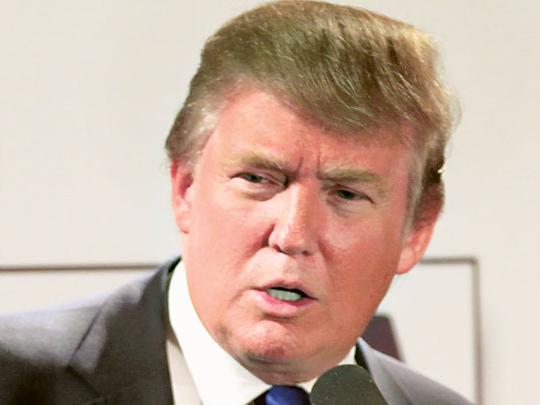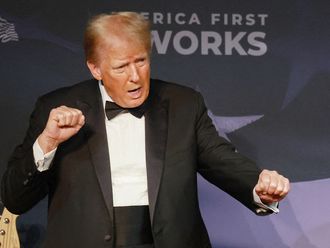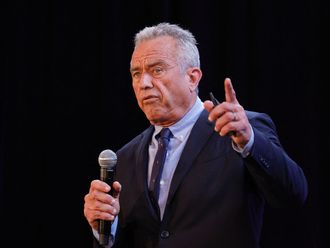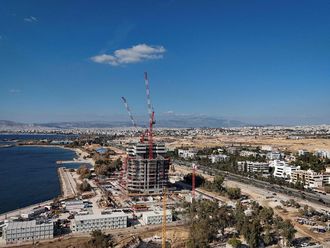
WASHINGTON: The United States on Monday reimposed the first round of Iranian trade sanctions that had been suspended under the 2015 nuclear agreement, distancing itself from every other country that signed the agreement and putting the accord's future in jeopardy.
Administration officials said the sanctions that have been waived for the past two and a half years will be snapped back officially on Tuesday morning at one minute past midnight.
From that moment on, Iran will be prohibited from using US dollars, the primary currency used for international financial transactions and oil purchases. Trade in metals, and sales of Iranian-made cars will be banned. Permits allowing the import of Iranian carpets and food, like pistachios, will be revoked. So will licenses that have allowed Tehran to buy US and European aircraft and parts - a restriction that comes just days after Iran completed the acquisition of five new commercial planes from Europe.
In a background call to reporters, senior administration officials said the goal was twofold: to prod Iran to renegotiate the nuclear agreement so it also addresses Iran's ballistic missile tests and adventuresome activities in the region, and also to change the government's behavior. They presented the United States as standing with Iranian protesters unhappy with the faltering economy and social issues, but insisted the United States is not seeking to get Iranians to rise up and institute regime change.
"The president has been very clear," one official said. "None of this needs to happen . . . . The Iranian people should not suffer because of their regime's hegemonic ambitions."
There was no immediate reaction from Iran, but some Iranian officials have said the US breach of its commitments under the deal frees them to resume their nuclear program.
The European Union and US allies Britain, France and Germany announced what they called a "blocking statute" to take effect Tuesday that would attempt to nullify US legal action against European firms doing business with Iran.
"We are determined to protect European economic operators engaged in legitimate business with Iran, in accordance with EU law," a joint statement said.
The long-anticipated sanctions move came 90 days after President Donald Trump withdrew the United States from the landmark 2015 agreement negotiated with five other world powers. It had suspended US and international sanctions in exchange for Iran agreeing to limits on its nuclear program. Iran's faltering economy will take an even bigger hit in another 90 days, on November 4, when sanctions on petroleum, the country's major export, are slapped back in place.
The administration set a series of deadlines for the reimposition of all sanctions to allow countries and private businesses to start preparing for them.
The International Atomic Energy Agency, which is charged with monitoring Iran's nuclear program, has consistently said Tehran remains in compliance with the commitments it made. No other country that negotiated the agreement with Iran, officially known as the Joint Comprehensive Plan of Action, has decided to back out of it.
The reimposition of US sanctions makes it difficult for Iran to participate in international trade because so many financial transactions are done in US dollars.
Trump has argued that the Obama-era agreement was deeply flawed. He characterized it as "decaying and rotten" when he announced the US withdrawal in May.
Secretary of State Mike Pompeo, returning from Asia Sunday night, told reporters that Iran's clerical leaders are "bad actors," and the administration aims to get Iran to "behave like a normal country".
Though Pompeo has refrained from calling for regime change, he has repeatedly said the United States stands with protesters unhappy with the state of the economy and hopes the Iranian people get more say in determining their leadership.
The Iranian rial has been in a free fall as the deadline for the first round of sanctions neared. Previous sanctions were widely credited with getting Iran to the negotiating table, and the leadership, and the government's promises that the deal would bear fruit with a booming economy never materialized.
Reuters, citing Iranian state television, said the country plans to try to prop up the rial currency by easing foreign exchange rules. The currency has lost about half its value since the spring because of international fears about the US sanctions April due to fears about the imminent US sanctions.
Iranian President Hassan Rouhani is expected to give a speech around 1 pm Washington time, addressing the economy and Trump's recent offer to meet with him.
The administration officials said the economy lagged in large part because of widespread corruption and Islamic Revolutionary Guard Corps domination. One official noted that almost 100 foreign companies have announced their intention to leave the Iranian market
"Foreign investors in Iran never know whether they are facilitating commerce or terrorism," the official told reporters.
The sanctions will squeeze the Iranian economy much more, and the government has already started talking about the need to return to an economy of resistance.
"We are very intent on using these financial sanctions to great economic leverage," another administration official said, characterizing the economy as on a downward spiral even before the sanctions decision was made. "There's nonquestion financial sanctions are going to continue to bring significant financial pressure against the world's largest state sponsor of terror."












